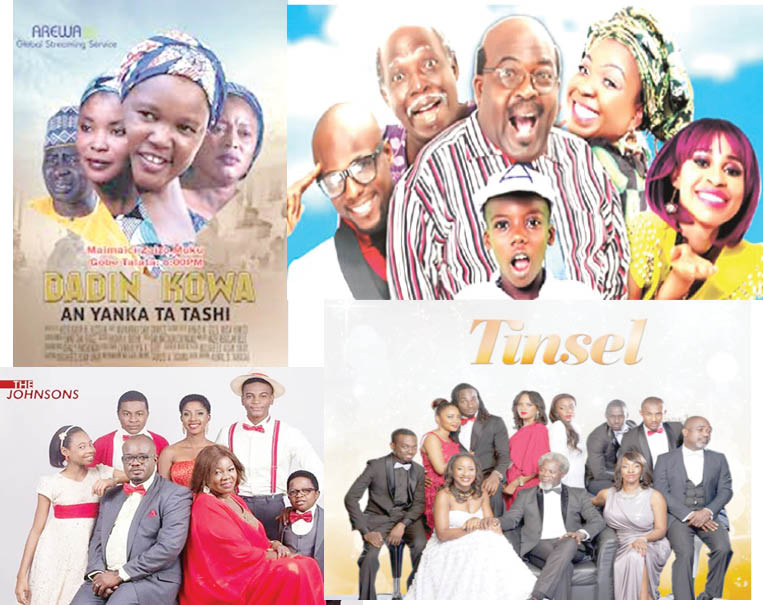Longest running TV shows in Nigeria
The beauty of a director’s work is in how they are able to keep their audience glued to the screens with storylines that intertwine and are easily relatable. TV series come and go, but these particular set of shows have been able keep their audience on lockdown since their first production and are still holding […]

Longest running TV shows in Nigeria
The beauty of a director’s work is in how they are able to keep their audience glued to the screens with storylines that intertwine and are easily relatable. TV series come and go, but these particular set of shows have been able keep their audience on lockdown since their first production and are still holding it down now. In this weekend magazine feature, Daily Trust Saturday lists out some ofthe longest-running TV shows in Nigeria.
Papa Ajasco (1996 – till date)
“Papa Ajasco” is a popular Nigerian television comedy show that has been entertaining viewers since its debut in the late 1990s. The plot revolves around the main character, Papa Ajasco, a foolish yet adorable man who frequently finds himself in funny and ridiculous situations.
The show is set in the fictional household of the “Ajasco” family and follows the adventures of Papa Ajasco, his wife Mama Ajasco, and their wild children. “Papa Ajasco” has become a cultural classic in Nigerian entertainment, due to its hilarious humour, savvy language, and famous catchphrases.
The show’s appeal lies in its ability to provide wholesome entertainment while offering a satirical take on societal issues. Through comedy, “Papa Ajasco” addresses themes such as family dynamics, gender roles, and community life. Over the years, it has maintained its popularity, solidifying its status as a timeless comedy classic in Nigerian television history.
- Woman cries for help as son battles kidney failure
- Hardship: Kogi needs economic emergency – Accord guber candidate
The main characters include Papa Ajasco, Mama Ajasco, Bobo Ajasco, Boy Alinco, Miss Pepeiye, Pa James and Pa Jimoh.
The Johnsons Family (2012 – till date)
“The Johnsons” is a popular Nigerian television series that provides viewers with amusement and relatability. The show, which debuted in 2012, has captivated over viewers with its amusing depiction of the Johnsons, an unconventional yet adorable middle-class family living in Lagos.
The television series revolves around the Johnson family’s everyday lives and navigating the funny problems and experiences they face. “The Johnsons” portrays the spirit of family dynamics and relationships with funny characters such as Mr Lucky Johnson, the father known for his complex plans; Mrs. Johnson, the sharp-witted and clever mother; and their different children, each with their own personality.
The show’s humour originates from the relatability of the situations shown, which represent the ups and downs of modern Nigerian family life. “The Johnsons” carefully confronts societal issues while entertaining the audience with smart banter, hilarious comedy, and a hint of sarcasm.
“The Johnsons” has maintained an active audience and won critical accolades for its ability to balance comedy with meaningful social commentary. The show has become a classic in Nigerian television, earning its place as a popular family comedy that connects across generations thanks to its sympathetic characters and light-hearted humour.
Dadin Kowa (2015 – till date)
In the Kannywood industry, Dadin Kowa takes the title for the longest running show on television. The soap opera debuted in 2015 on Arewa 24 and till date has kept its audience entertained through creating funny but relatable scenarios.
The program is set in the fictional town of Dadin Kowa and gives an insight into the lifestyle and daily struggles of the people of Northern Nigeria. The series discusses social issues such as the exploitation of the Almajiri system, terrorism and insurgency, girl child education in the North, drug abuse among the youth, political thuggery, and the daily struggle of co-wives over their husband.
Dadin Kowa acts as a learning platform and reference tool for the people of the Northern region, as it allows audiences to perceive themselves through the lives of the characters. Their hopes and challenges are all laid out in front of them, providing the audience with an informed sense of decision-making addressing relevant matters in their personal lives.
The main characters of the show include Mr Olabode (Sha’aibu Abdullahi), his wife, Stella (Beatrice A. Williams), Timothy (Danjuma Salisu), Timothy’s girlfriend, (Zainab Haruna), Anaconda (Uchenne Nnwandi), Sergeant Dogo (Kingsley Nnamani) and Mary (Hajara Yakubu),
In 2016, the series received the 2016 Africa Magic Viewer’s Choice Award for best Hausa movie/television series
Tinsel (2008 – till date)
“Tinsel” is a Nigerian television drama series that has captured the hearts of audiences since its debut in 2008. The show has aired on Africa Magic for over 14 years. In 2022, the cast and crew celebrated a milestone of hitting 3500 episodes and also the title of being Nigeria’s and Africa’s longest-running TV show.
Set in the bustling entertainment industry of Lagos, Nigeria, the show provides an insightful and often dramatic peek into the lives of individuals working in the film, music, and fashion sectors. The series is known for its engaging storyline, compelling characters, and its ability to portray the glitz and challenges of the entertainment industry. “Tinsel” explores themes of desire, love, competition, and family ties against the backdrop of the beautiful but dark world of show business.
“Tinsel” centres on the interactions between the employees of an upscale production company called Reel Studios. The characters’ personal and professional lives clash, producing a web of relationships that reflects the complex nature of modern life. The show not only explores the highs and lows of the entertainment industry, but it also addresses bigger societal issues, giving the story substance and relatability.
One of the show’s remarkable features is its portrayal of strong, dynamic women characters who challenge norms and break barriers within the male-dominated industry. These characters resonate with audiences, shedding light on the changing landscape of gender roles and expectations in Nigeria.
